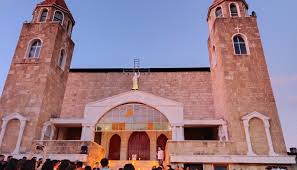The Syrian Ministry of Interior announced on Wednesday that internal security forces in Tartus successfully thwarted an attempted terrorist attack on a Maronite church in the countryside of Safita. According to the statement, a special operations unit arrested two suspects—identified as Ramzi Hammoud and Mundhir Ali—while they were preparing to detonate explosive devices inside the Church of Mar Elias in the village of Al-Khraybat.
Colonel Abdul-Aal Mohammad Abdul-Aal, head of internal security in Tartus, said the operation was carried out based on precise intelligence indicating that the suspects, allegedly affiliated with remnants of the former regime, had been surveilling the church in preparation for a bombing aimed at targeting worshippers and inciting sectarian strife in the region.
Security forces conducted a tightly coordinated ambush following intensive surveillance. During the raid, officers seized an improvised explosive device ready for detonation, handwritten notes containing threats against local residents, and a black flag associated with extremist ideology.
Colonel Abdul-Aal stressed that internal security forces “will not permit any party to jeopardize the safety and stability of the region,” affirming their role as a “fortified shield protecting the homeland and its citizens from all threats.”
The operation reflects the government’s continued policy of preemptive security measures aimed at preventing attacks on religious sites and dismantling dormant terrorist cells—particularly in relatively stable regions like Tartus.
Broader Counterterrorism Campaign Follows Damascus Church Bombing
The thwarted plot in Tartus follows a deadly suicide bombing last month at the Mar Elias Church in the Dweila’a district of Damascus. Initial investigations by the Ministry of Interior revealed that the attacker was not Syrian and had entered the capital from the Al-Hol refugee camp via the Syrian desert. A second non-Syrian suicide bomber, also part of the same cell, was reportedly planning a parallel attack on the Sayyida Zainab shrine in the Damascus suburbs.
Interior Ministry spokesperson Nour Al-Din Al-Baba confirmed during a press conference that the terrorist cell responsible for the Damascus bombing was directly affiliated with ISIS. He added that the attackers had received logistical support from cell leader Mohammed Abdel-Ilah Al-Jumaili—also known as “Abu Imad Al-Jumaili”—a Syrian national formerly referred to within ISIS as the “Wali of the Desert.”
Subsequent security operations in Harasta and Kafr Batna led to the dismantling of another ISIS-linked network. Authorities apprehended the group’s leader and five other operatives, while two militants were killed during the raids. One of the deceased was reportedly the individual who had facilitated the suicide bomber’s entry into the church in Damascus; the second was planning a new attack in the capital.
In addition to weapons, authorities confiscated suicide vests, landmines, a stockpile of ammunition, and an explosives-rigged motorcycle.
Pattern of Targeting Religious Sites
Security sources suggest that targeting houses of worship—particularly churches—has become a recurring tactic for terrorist groups aiming to destabilize Syria and provoke sectarian discord. The Ministry of Interior emphasized that it will continue implementing a proactive security doctrine designed to disrupt such attacks before they can be carried out.
Officials reaffirmed their commitment to protecting civilians and preserving communal harmony across the country, vowing to pursue and dismantle any networks or cells attempting to resurrect extremist violence under the guise of religious or political motives.
This article was translated and edited by The Syrian Observer. The Syrian Observer has not verified the content of this story. Responsibility for the information and views set out in this article lies entirely with the author.


